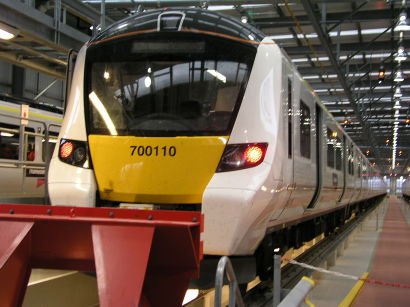TRANSPORT secretary Chris Grayling has told a committee of MPs that any penalty for Govia Thameslink Railway following disruption earlier this year will be decided ‘within weeks’.
He was giving evidence to the House of Commons Transport Committee on 22 October.
Mr Grayling said the action was being ‘finalised’, and he did not rule out terminating the franchise altogether, with the alternative of a financial penalty.
When questioned about the failed 20 May timetable changes, which should have seen another 400 services a day on Govia Thameslink routes but actually led to prolonged disruption, Mr Grayling said the problem was ‘systemic’. He has recently launched a ‘root and branch’ review of the railway industry, and told the Committee that he wanted to see ‘wholesale change’, and that the industry needs to be ‘much more joined up’.
He explained: ‘We will make sure there is a consequence to the under-performance of GTR this summer within a small number of weeks.’
Analysis
Sim Harris
THIS is a difficult one for Mr Grayling. Another difficult one, really, since his Department is also juggling with other problems such as Intercity Express issues and a lagging electrification programme which helped to contribute to disruption on Northern, also from 20 May.
But the GTR franchise – the largest earner on the network – is unusual, since the costs risk (i.e. responsibility for paying the bills) rests with Govia while the revenue from tickets goes straight to the DfT. Govia is paid a fee instead.
This ‘management contract’ structure was worked out because the present GTR franchise is supposed to bridge the gap between the old and new Thameslinks, which should eventually see 24 trains an hour in each direction running under central London at peak times.
Mr Grayling had already been warned by Chris Gibb in a special report that such an intensive service would not work without extensive infrastructure upgrades, which have been authorised.
But the Thameslink chaos (not too harsh a word) following the timetable change in May also demonstrated that the GTR network is not even ready for a less ambitious set of improvements.
Mr Grayling may be determined to hold GTR to account for its share of the trouble, but the mechanism will be difficult, because a significant financial penalty could be more than Govia is willing to take. Its majority shareholder, GoAhead Group, has already warned that the customary profit of 3 per cent is set to be halved as a result of higher costs.
What Mr Grayling really does not want is to bring the axe down on another franchise, after the loss of Virgin Trains East Coast in June. Every mid-term franchise exit is another nail in the coffin of the franchising model, which has been looking increasingly fragile in any case after it became known that profits for other operators have been plunging recently.
Franchise owners such as Abellio have been taking the strain so far, but recently the Dutch company had to support Greater Anglia with an additional £80 million. FirstGroup, meanwhile has warned that it will have to make provision for losses of £120 million or so during the life of the TransPennine Express franchise. It has also become harder in recent years to draw up decent shortlists of bidders for future franchises.
So while Mr Grayling may wish to make a point by delivering a suitable punishment to GTR, he will have to take the greatest of care. If he overdoes the retribution, he could risk demolishing the whole house of cards which franchising has become.


